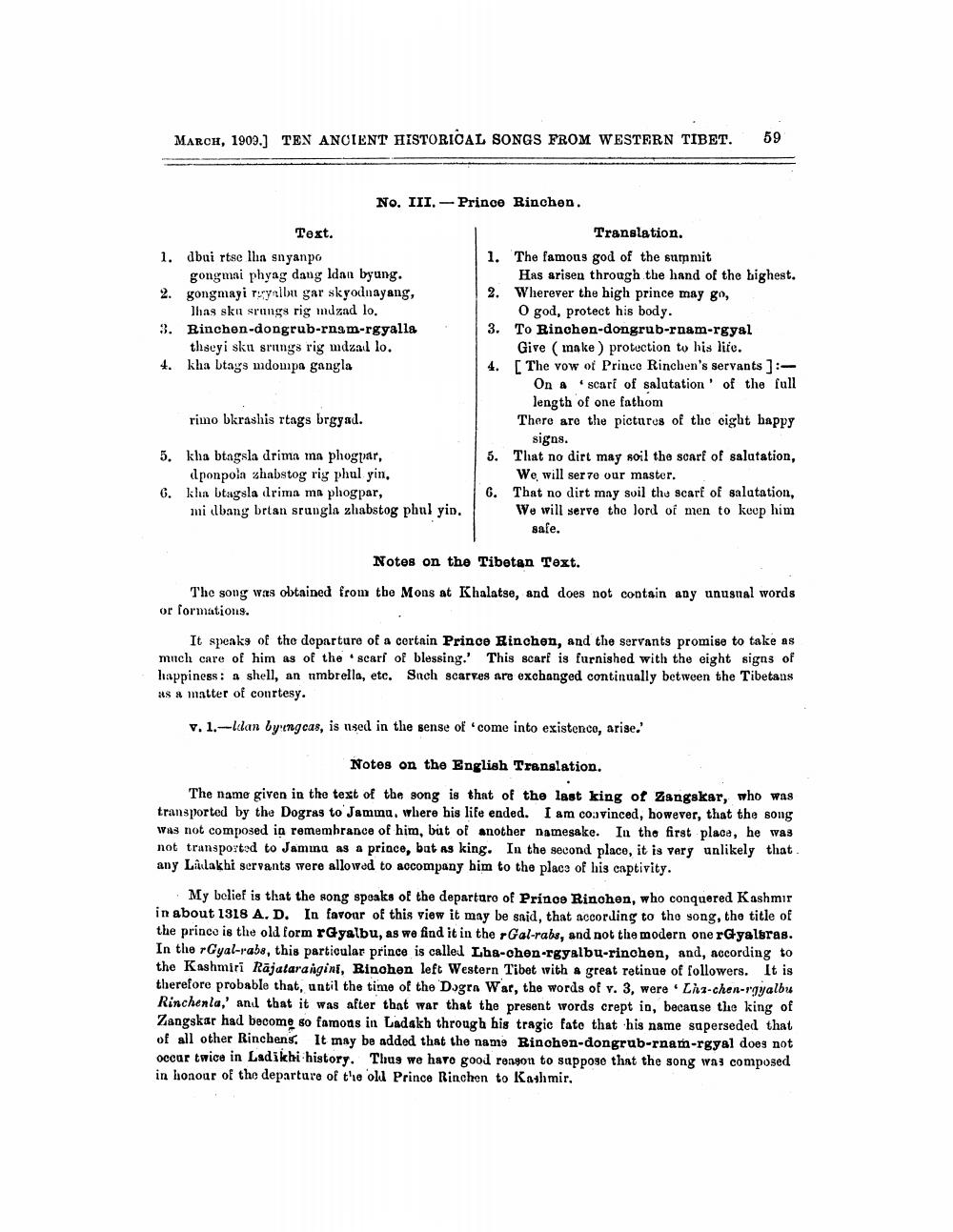________________
MARCH, 1909.) TEN ANCIENT HISTORICAL SONGS FROM WESTERN TIBET.
59
No. III. - Prince Rinchen.
Text. 1. dbui rtse Iha snyanpo
gongmai phyag dang ldan byung. 2. gongmayi tuyallu gar skyodnayang,
Thas sku srange rig muzad lo. 3. Binchen-dongrub-rnam-rgyalla
thseyi sku srungs rig mdzal lo. 4. kha btays mdompa gangla
Translation. 1. The famous god of the summit
Has arisen through the hand of the highest. 2. Wherever the high prince may go,
O god, protect his body. 3. To Rinchen-dongrub-rnam-rgyal
Give (make) protection to his life. 4. [The vow of Prince Rinchen's servants]:
On a scari of salutation of the full
length of one fathom There are the pictures of the cight happy
sigas. 5. That no dirt may soil the scarf of salutation,
We will ser 70 our master. 6. That no dirt may soil thu scarf of salatation,
We will serve the lord of men to keep him
safe.
rimo bkrashis rtags brgyad.
5. kha btagsla drima ma phogpar,
dponpola zhabstog rig phul yin, 6. kha btagsla dirima ma plogpar,
mi bang brtan sungla zhabstog phul yin.
Notes on the Tibetan Text. The song was obtained from the Mons at Khalatse, and does not contain any unusual words or formations.
It speaks of the departure of a certain Prince Rinchen, and the servants promise to take as much care of him as of the scarf of blessing.' This scarf is furnished with the eight signs of happiness: a shell, an umbrella, etc. Snch scarves are exchanged continually between the Tibetans as a matter of courtesy.
v. 1.-
an byengcas, is used in the sense of come into existenco, arise.'
Notes on the English Translation. The name given in the text of the song is that of the last king of Zangakar, who was transported by the Dogras to Jamna, where his life ended. I am coavinced, however, that the song was not composed in remembrance of him, but of another namesake. In the first place, he was not transported to Jamia as a prince, but as king. In the second place, it is very unlikely that. any Lalaki servants were allowed to accompany him to the place of his captivity.
: My belief is that the song speaks of the departuro of Prince Rinchen, who conquered Kashmir in about 1318 A.D. In favour of this view it may be said, that according to the song, the title of the princo is the old form rGyalbu, as we find it in the Gal-rabs, and not the modern one rGyalsras. In the rGyal-rabs, this particular prince is callel Lha-chen-rgyalbu-rinohen, and, according to the Kashmiri Rājatara igini, Binohen left Western Tibet with a great retinue of followers. It is therefore probable that, until the time of the Dogrn War, the words of v. 3, were.Lhz-chen-rgyalbu Rinchenla,' and that it was after that war that the present words crept in, because the king of Zangskar had become so famous in Ladakh through his tragic fate that his name saperseded that of all other Rinchens. It may be added that the name Binohen-dongrub-rnam-rgyal does not occur twice in Ladikhi history. Thus we havo good renson to suppose that the song was composed in honour of the departure of the old Prince Rinchen to Kashmir.




